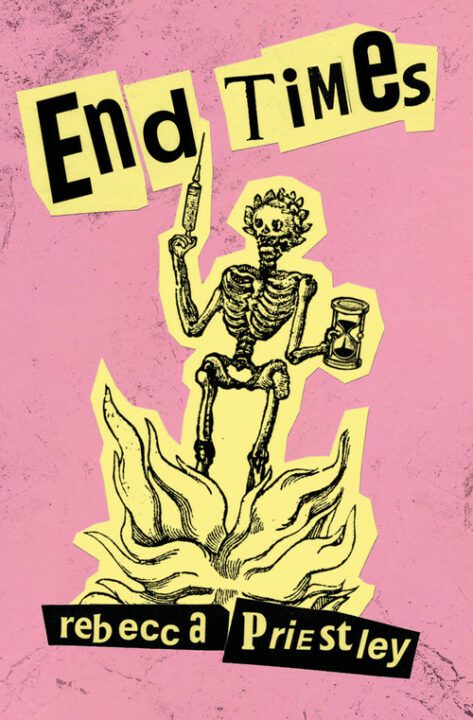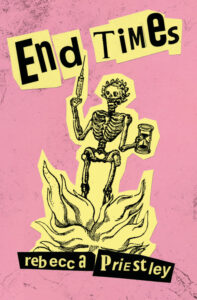End Times

End Times by Rebecca Priestley. THWUP (2023). RRP: $35.00. PB, 240pp. ISBN: 9781776921188. Reviewed by Hester Ullyart.

Dedicated to ‘Maz, my BFF’, End Times is based upon a week-long real-life West Coast road trip in 2021, mapping anxiety, formative teenage years, and rocks—metaphorical and literal. It would make an awesome female-gaze-scientist-post-kids buddy movie. You heard it here first.
Priestley is a scientist and academic (as well as a mother, partner and ex-born-again Christian) and it is through her narration that we map granite, the risks of the Alpine Fault, coal-mining, and, importantly to the wiring of the book, the personalities she meets along the route. Navigating the treacherous realities of environmental damage on the dynamic coastline and its interwoven humanity is a task for the brave, and it makes for an absorbing Iliad of sorts. Looming monsters take the shape of potential earthquakes and climate deniers. In the spirit of knowledge being power, Rebecca goes in search of the beast, with her best mate Maz in tow.
Theirs was an adolescence worth documenting. Seven of fourteen chapters dip into their 80s upbringing in Wellington, flashbacking into their two-year teenage plunge into Christianity, as their non-religious parents watched on open-mouthed.
With distance, Priestley sees it as:
‘…the need to be saved from the anxieties of our age. We swapped fighting racism, sexism, and nuclear war for fighting Satan, infidels and Worldliness. What a waste of time.’ (p.98)
The girls were seemingly seduced by the invite-only esoteric community. They deep dived into a world of hormonal kids speaking in tongues, swooning under the grace of God. I would argue that as dangerous as the beliefs that this group peddled became, the girls’ experience was still a saviour in its way. It can be tough being a girl. And dangerous. Rebecca and Maz swapped a path of self-destruction for sobriety, connection and love (before it inevitably got weird). In time, they tired and saw the light to the darker side of this community (no doubt to the relief of their guardians). A new phase stepped in, but they had to learn it for themselves.
Cut to 30 years or more later, when, with a lot to be proud of, a high-achieving Priestley is on orders to ‘fucking enjoy yourself’ (p.17).
As the writer unfurls, we do too:
‘I hold back tears on the beach. Just for a moment I get a sense, a glimmer of peace that I want to find a way to hold on to.’ (p.86)
Gradually, the friends sink further into their happy, unkempt stations, on a diet of pies (albeit the West Coast’s best), wine, lollies, days-old clothes, the odd cheeky spliff. But the glimmer of danger is never far. On a personal invitation to find the best kept glow-worm colony in the country, their male guide jokes darkly:
‘I brought a single girl down here once, a European backpacker—that was a high trust situation’ (p.172).
End Times is a Thelma and Louise for the climate aware generation—here the women are finally on top, whatever that means, the cliff to be driven off is the one the world is digging itself into. The rocks fall into the sea, the idiots rave on, it might all come tumbling down, yet we save each other, again and again.
Hester Ullyart is an award-winning multi-disciplinary artist of poetry, theatre, film and music. Original performed works include The Ballad of Paragon Station, Paragon Dreams, Notes on a Migration and I am all the rooms of the house. Her poetry has been published in Catalyst Volumes 17 and 20, A Fine Line, and Mountain Culture 1964, among others. She trained at the Royal Academy of Dramatic Art, London and hosts Common Ground Spoken Word in Lyttelton.